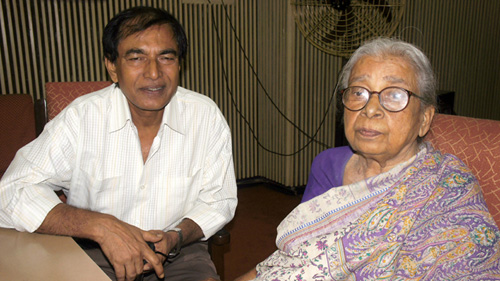
Rudaali, will you weep for Mahasweta?
"The reason and inspiration for my writing are those people who are exploited and used, and yet do not accept defeat. For me, the endless source of ingredients for writing is in these amazingly noble, suffering human beings," the author had once said.
Mahasweta Devi, the eminent Bengali author and social activist, who passed away in Kolkata on Thursday, will always be remembered for her intellectual vigour. Her versatile style could turn a radical thought into a work of highly acclaimed literary fiction.
She travelled widely, not only crossing continents, but also deep inside India's forests and villages, to reveal to the world the exploitation, the sub-human living condition and the poverty of the people who lived here. The tribal people of West Bengal and other eastern states had a champion in her.
Born in Dhaka (now capital of Bangladesh) in 1926, to poet Manish Ghatak (who wrote under the pen name of Jubanashwa) and Dharitri Devi, she was educated in Dhaka, Shantiniketan and Calcutta (now Kolkata). Her uncle was the famous film maker Ritwik Ghatak. She married (and later divorced) eminent Bengali playwright Bijon Bhattacharya (also a founding member of the IPTA movement). Her son, late Nabarun Bhattacharya was a novelist in his own right.
She began her writing career with the publication of her book Jhansir Rani. She also worked as a teacher in a college in Calcutta.
Slowly, creative writing and social activism became her dual passion.
She was also a contributor to the famous Bengali children's magazine, Sandesh.
Scholar and literary critic, Gayatri Chakravorty Spivak and others have translated several of her works -- Breast Stories, Imaginary Maps, Dust on the Road, etc.
Several of her stories have been turned into movies -- Sungursh (1968), Rudaali (1993), Hazaar Chaurasi Ki Maa (1998), Gangor (2010).
It is not surprising that awards came her way often enough -- Sahitya Akademi Award, Padmashir and Padma Bibhusan, Jnanpith Award, Ramon Magsaysay Award, Bangabibhushan, Mamoni Raisom Goswami National Award for Literature and more.
The passing away of Mahasweta Devi is a not only a loss for the literary world but also for the revolutionary as well.
Support Our Journalism
We cannot do without you.. your contribution supports unbiased journalism
IBNS is not driven by any ism- not wokeism, not racism, not skewed secularism, not hyper right-wing or left liberal ideals, nor by any hardline religious beliefs or hyper nationalism. We want to serve you good old objective news, as they are. We do not judge or preach. We let people decide for themselves. We only try to present factual and well-sourced news.







